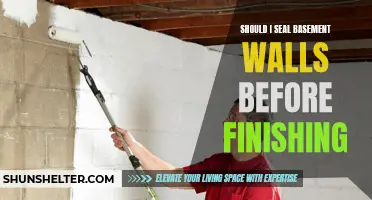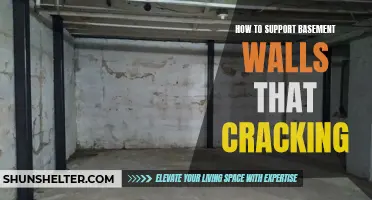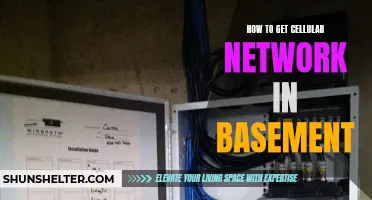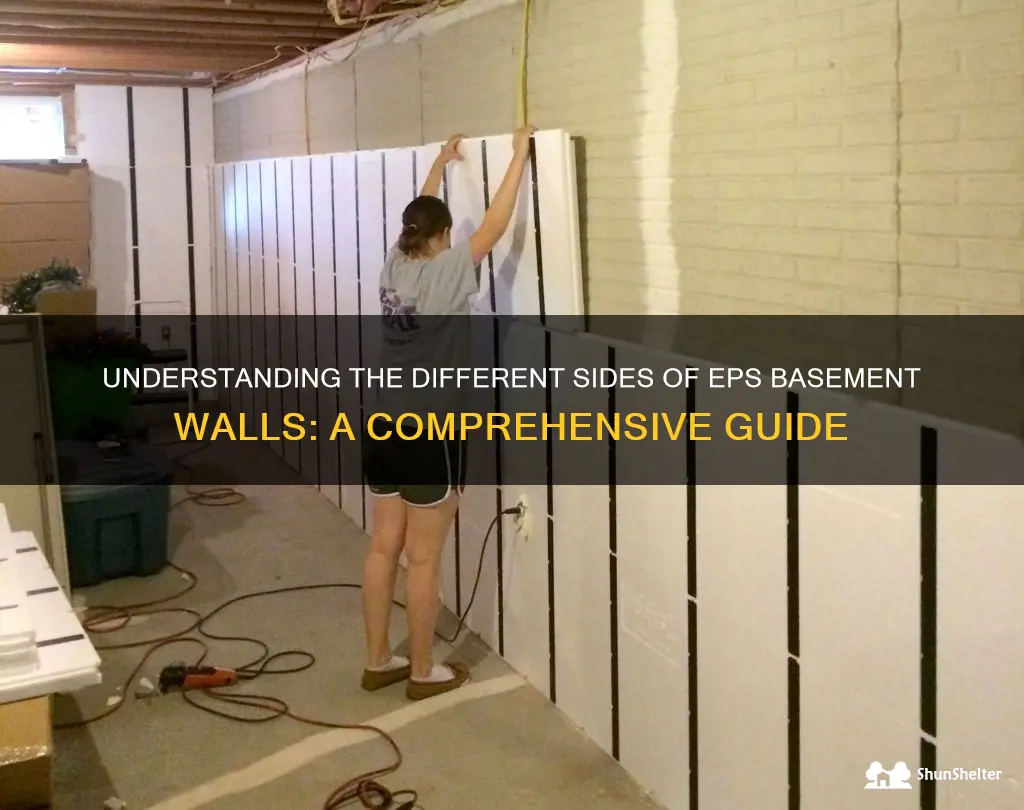
EPS (Expanded Polystyrene) basement walls are a revolutionary solution for homeowners looking to enhance the energy efficiency and durability of their basements. These walls, made from high-quality insulation foam, offer several benefits that set them apart from traditional materials like concrete or wood. Whether you're considering finishing your basement or want to create a more comfortable living space, understanding the advantages of EPS basement walls is crucial. In this article, we will delve into both sides of EPS basement walls, exploring their features and highlighting why they are an excellent choice for any homeowner.
What You'll Learn

Pros of Using EPS Basement Walls
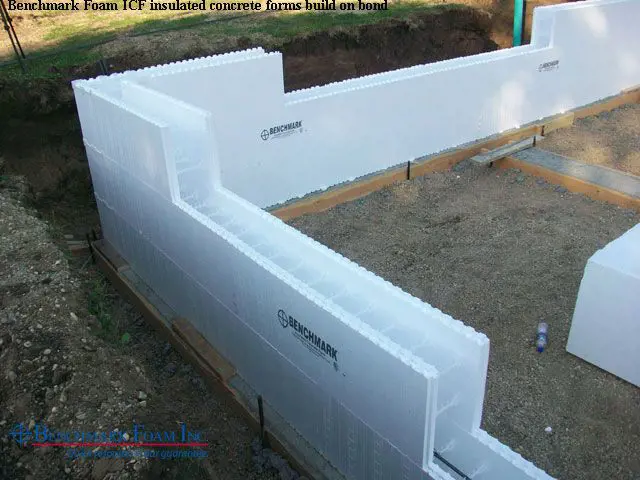
If you are planning to finish your basement or looking for an efficient way to insulate it, consider using EPS (expanded polystyrene) basement walls. EPS is a lightweight and versatile material that has many benefits when it comes to basement insulation. In this article, we will discuss some of the pros of using EPS basement walls.
- Excellent insulation properties: EPS has one of the highest R-values among insulation materials. R-value measures the thermal resistance of a material, and higher R-values mean better insulation. EPS basement walls can help keep the temperature in your basement consistent, preventing heat loss in the winter and heat gain in the summer. This can lead to energy savings and a more comfortable living space.
- Moisture resistance: EPS is a closed-cell material, which means that it does not absorb water. This makes it an ideal choice for basement walls, as it can resist the moisture that is often present in below-grade areas. Moisture can lead to mold and mildew growth, which can be harmful to your health and the integrity of your home. Using EPS basement walls can help prevent moisture-related issues and improve the air quality in your basement.
- Mold and mildew resistance: In addition to being moisture-resistant, EPS is also resistant to mold and mildew growth. Mold and mildew thrive in damp environments, and traditional building materials like wood and drywall can be vulnerable to their attack. By using EPS basement walls, you can create a mold and mildew-resistant barrier that will help protect your basement from these potential problems.
- Easy installation: EPS basement walls are easy to install and require minimal effort. They come in pre-cut panels that can be easily fitted together, reducing the need for extensive measuring and cutting. This makes the installation process faster and more convenient, saving you time and money.
- Structural integrity: EPS basement walls are not only good for insulation but also contribute to the overall structural integrity of your basement. The panels provide additional strength and stability to the walls, helping to prevent cracks and other structural issues. This can be especially important in areas prone to earthquakes or other natural disasters.
- Soundproofing: EPS has excellent soundproofing properties, making it ideal for basement walls. If you plan to use your basement as a recreational area or a home theater, using EPS walls can help reduce the transmission of sound between the basement and the rest of your home. This can create a more peaceful and enjoyable living environment.
In conclusion, using EPS basement walls has numerous benefits. From excellent insulation properties to moisture and mold resistance, easy installation, structural integrity, and soundproofing capabilities, EPS is a versatile and effective choice for your basement insulation needs. Consider incorporating EPS into your basement remodel or renovation to enhance the comfort, energy efficiency, and overall value of your home.
Exploring the Standard Width of Basement Walls: A Guide for Homeowners
You may want to see also

Cons of Using EPS Basement Walls
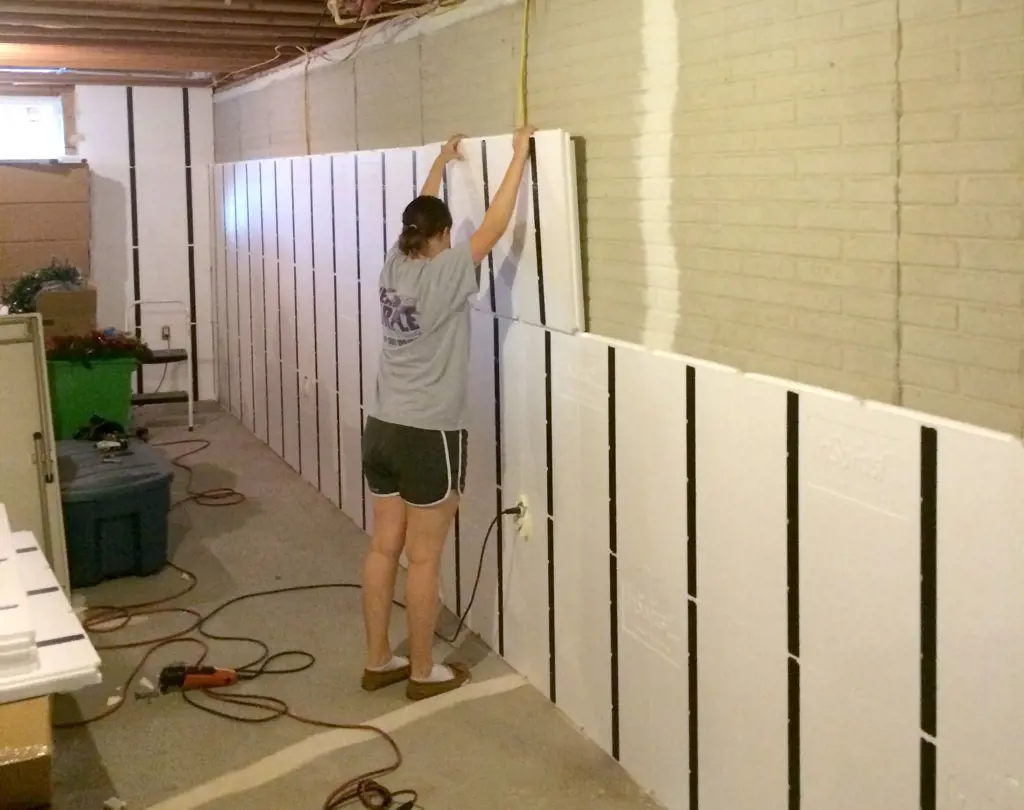
EPS basement walls, also known as expanded polystyrene basement walls, may seem like an attractive option for homeowners looking to finish their basements. EPS basement walls offer benefits such as insulation, moisture resistance, and ease of installation. However, there are also some cons to using EPS basement walls that homeowners should be aware of before making a decision. In this article, we will discuss some of the cons of using EPS basement walls.
One of the main cons of using EPS basement walls is the potential for moisture and mold issues. While EPS has moisture-resistant properties, it is not completely impervious to water. If there is a plumbing leak or excessive moisture in the basement, the EPS may absorb the water and become a breeding ground for mold and mildew. This can lead to health issues for the occupants of the home, as well as damage to the walls and insulation.
Another con of using EPS basement walls is the limited structural support they provide. EPS is not as strong as some other building materials, such as concrete or wood, and may not be able to withstand the weight of a finished basement. This can be a concern if you are planning to add heavy furniture, shelves, or equipment to your basement. Additionally, EPS basement walls may not be able to withstand the pressure from the surrounding soil, which can lead to cracks and structural damage.
In addition to moisture and structural concerns, EPS basement walls may also be susceptible to pest infestations. EPS is made from a type of foam, which can be an inviting home for insects and rodents. If there are cracks or gaps in the EPS, pests can easily find their way in and make a comfortable living space within the walls. This can be a major hassle for homeowners and can require costly pest control measures.
Lastly, EPS basement walls may not be as aesthetically pleasing as other options. While you can cover the EPS with drywall or other finishing materials, the foam may still be visible in certain areas. This can detract from the overall look of your finished basement and may not give you the polished appearance you desire.
Overall, while EPS basement walls offer some benefits, there are also several cons to consider. These include potential moisture and mold issues, limited structural support, susceptibility to pest infestations, and a less-than-ideal aesthetic. Before deciding to use EPS basement walls, homeowners should carefully weigh these cons against the potential benefits to determine if this is the right choice for their basement finishing project.
Should Flaking Concrete Basement Walls be Painted?
You may want to see also

Alternatives to EPS Basement Walls
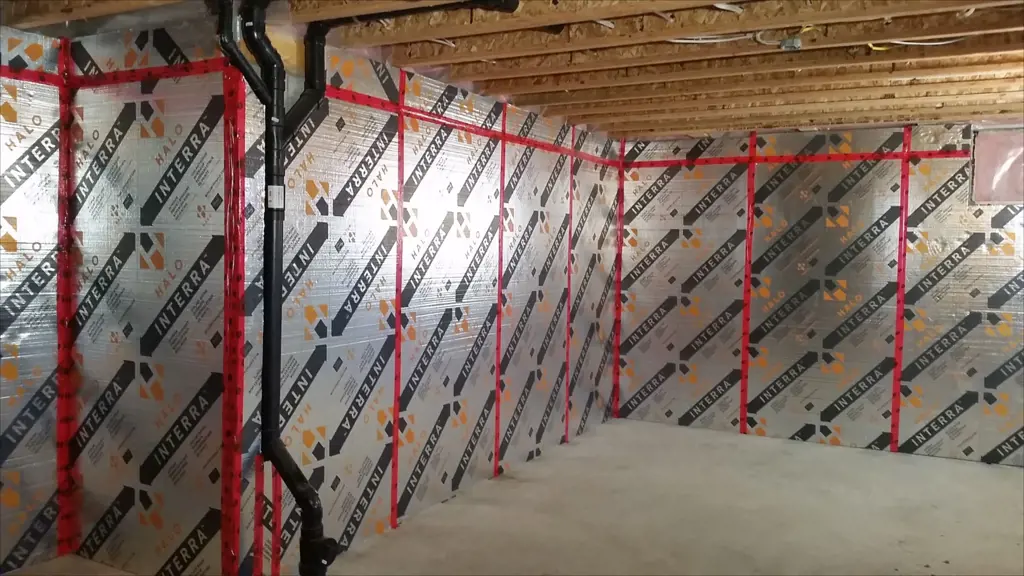
EPS basement walls, also known as expanded polystyrene basement walls, have become popular in recent years due to their insulation properties and ease of installation. However, there are several alternatives to EPS basement walls that you may want to consider before making a decision for your basement renovation or new construction project. In this article, we will explore some of these alternatives and their benefits.
Concrete Block Walls:
One popular alternative to EPS basement walls is concrete block walls. Concrete blocks are durable and resistant to moisture, making them an excellent choice for basement walls. They can be easily installed by stacking the blocks and securing them with mortar. Concrete block walls also provide good insulation properties and can help regulate the temperature in your basement.
Insulated Precast Concrete Panels:
Insulated precast concrete panels are another alternative to EPS basement walls. These panels are made of precast concrete with built-in insulation, providing both structural support and insulation in one product. They are easy and quick to install, as they can be manufactured off-site and then transported to the construction site. Insulated precast concrete panels offer excellent thermal performance and can save you time and money during the construction process.
Insulated Concrete Forms (ICFs):
ICFs are a popular choice for basement walls due to their superior insulation properties. They are made of foam boards that are assembled to create the desired wall thickness and height. Once in place, the ICFs are filled with concrete to provide structural support. The foam boards act as insulation and help maintain a consistent indoor temperature. ICFs also offer excellent soundproofing capabilities and are resistant to moisture and pests.
Engineered Wood Walls:
If you prefer a more sustainable and eco-friendly option, engineered wood walls can be an excellent alternative to EPS basement walls. These walls are made of engineered wood products, such as oriented strand board (OSB), which are made from recycled or sustainably harvested wood fibers. Engineered wood walls are lightweight, easy to install, and provide good insulation properties. They are also resistant to moisture and can be finished with different types of surfaces, such as paint or wallpaper.
Insulated Metal Panels:
Insulated metal panels (IMPs) are another alternative to consider for your basement walls. These panels are made of metal sheets with built-in insulation. IMPs offer excellent thermal performance, durability, and fire resistance. They can be easily installed and provide a modern and sleek look to your basement. Insulated metal panels are also highly resistant to moisture and can help reduce energy costs.
When choosing among these alternatives to EPS basement walls, it is important to consider factors such as insulation properties, durability, moisture resistance, ease of installation, and cost. Consulting with a professional contractor or architect can help you determine the best choice for your specific needs and budget. Remember that the quality of the installation is crucial for the performance and longevity of your basement walls, so hiring a reputable contractor is essential.
Signs to Look For to Determine if Basement Walls Have Been Properly Poured
You may want to see also

Cost Considerations for EPS Basement Walls
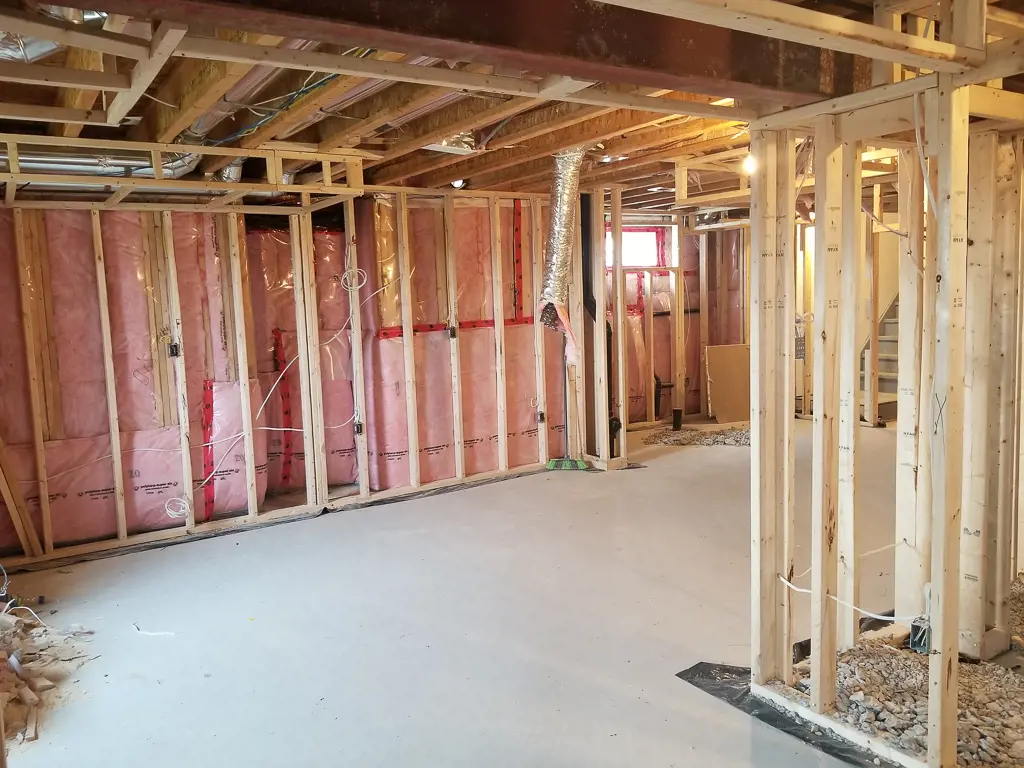
When it comes to building or renovating a basement, one important decision to make is which type of walls to use. EPS (expanded polystyrene) basement walls are a popular choice due to their energy efficiency and durability. However, it's important to consider the cost implications of using EPS walls. In this article, we will discuss the various cost considerations of using EPS basement walls.
Material Cost:
The material cost of EPS basement walls is typically higher than traditional concrete walls. EPS foam panels can cost between $2 and $4 per square foot, while poured concrete walls typically cost around $10 per square foot. However, it's important to note that EPS walls provide a higher R-value, which means they offer better insulation and can potentially lower energy costs in the long run.
Installation Cost:
The installation cost of EPS basement walls can vary depending on the complexity of the project and the region you are in. Generally, the cost of installation is higher for EPS walls compared to traditional concrete walls. This is because EPS walls require specialized knowledge and equipment to install properly. It's recommended to hire a professional contractor with experience in EPS wall installation to ensure the job is done correctly and to avoid any costly mistakes.
Energy Savings:
One significant cost consideration when using EPS basement walls is the potential energy savings. EPS walls provide excellent insulation, which can help reduce heating and cooling costs. The higher R-value of EPS walls compared to concrete walls means they can keep the basement at a more stable temperature, reducing the need for excessive heating or cooling. Over time, the energy savings can offset the initial higher material and installation costs of EPS walls.
Long-Term Durability:
Another cost consideration when using EPS basement walls is their long-term durability. EPS walls are resistant to moisture, rot, and pests, unlike traditional concrete walls that are susceptible to cracking and water damage. This means that EPS walls require less maintenance and repair over time, saving you money in the long run.
Potential for Additional Costs:
While EPS basement walls can provide cost savings in the long run, it's important to consider potential additional costs. For example, if the basement needs to be finished or remodeled, using EPS walls may require special consideration for attaching drywall or other finishes. It's important to discuss these additional costs with your contractor before making a decision.
In conclusion, while EPS basement walls may have a higher initial cost compared to traditional concrete walls, they offer numerous benefits that can lead to long-term cost savings. From increased energy efficiency to reduced maintenance and repair costs, EPS walls can provide a great return on investment over time. It's essential to consider these cost considerations when deciding on the type of walls to use in your basement.
Revitalizing Your Cinder Block Basement Walls: How to Stucco for an Exterior Makeover
You may want to see also
Frequently asked questions
The smooth side of EPS basement walls should be exposed to create a more finished appearance.
Yes, EPS basement walls can be painted with the appropriate type of paint specifically designed for use on EPS foam.
A vapor barrier should be installed on the warm side of EPS basement walls, which is typically the interior side in colder climates.
Insulating the exterior side of EPS basement walls is not necessary if the interior side is properly insulated and a vapor barrier is in place. However, adding exterior insulation can provide additional energy efficiency benefits.



